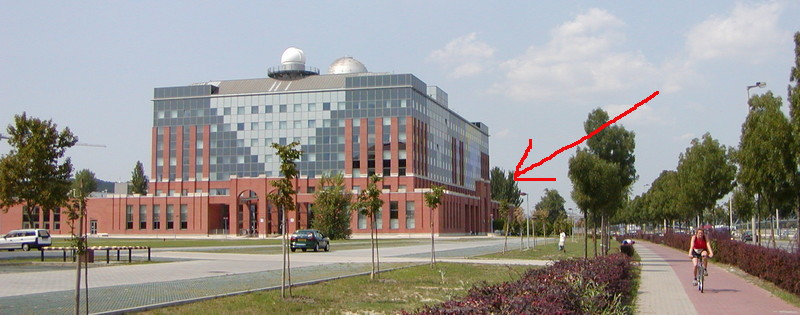Lattice Gauge Theory group
 We are the lattice gauge theory group at the Eotvos University
in Budapest, part of the Department of Theoretical Physics at the
Faculty of Science.
We are the lattice gauge theory group at the Eotvos University
in Budapest, part of the Department of Theoretical Physics at the
Faculty of Science.
Currently there are nine members and we are seeking new ones. Positions are available for PhD students and postdocs for 2 - 4 years appointments. If you are interested please email Sandor Katz at katz@bodri.elte.hu or Daniel Nogradi at nogradi@bodri.elte.hu.
Our activities are and were funded by various funding agencies for which we are grateful, these include the Lendulet grant of the Hungarian Academy of Sciences, the OTKA-NF-104034 grant of OTKA and the EU Framework Programme 7 grant (FP7/2007-2013)/ERC No 208740.
Timetable of department common room.
Research
Our primary interests are:
- Chiral symmetry restoration and deconfinement in QCD with Wilson fermions
- Finite chemical potential
- QCD hadron spectrum
- Eigenvalue distributions of the overlap Dirac operator
- Strongly interacting Higgs sector - strong dynamics
- Conformal gauge theories
Seminar
Weekly ELFT seminars at the Department of Theoretical Physics
Location: 2nd floor, 2.54, Novobatzky room, 1117 Budapest, Pazmany Peter setany 1/a
If you'd like to receive seminar email announcements please write to nogradi@bodri.elte.hu
Time: Tuesdays at 14:15
See the archive for seminars since 2014.
-
1 October 2024, Sandor Varro (ELI)
TBA
TBA
-
8 October 2024, Balazs Pozsgay
TBA
TBA
For students
Our group offers BSc/MSc diploma, PhD and TDK topics in Lattice Field Theory.
Please contact Sandor: katz@bodri.elte.hu or Daniel: nogradi@bodri.elte.hu in case you are interested.
Current topics include:
- QCD thermodynamics
- 2 and 4 dimensional CFT
- Beyond Standard Model
People
assistant professor
2009 PhD - University of Pisa, Italy
2010-2010 postdoc - IPhT/CEA-Saclay, France
2010-2012 postdoc - University of Zaragoza, Spain
2012-2015 postdoc - ATOMKI, Debrecen, Hungary
2015-2018 postdoc - Eotvos University, Budapest, Hungary
professor
2001 PhD - Eotvos University, Hungary
2001-2003 postdoc - DESY, Hamburg, Germany
2003-2005 postdoc - University of Wuppertal, Germany
2006-2012 assistant professor - Eotvos University, Hungary
2012- professor - Eotvos University, Hungary
professor
1996 PhD - UCLA, USA
1996-1998 postdoc - University of Colorado, Boulder, USA
1998-2000 postdoc - University of Leiden, the Netherlands
2000-2002 postdoc - DESY, Zeuthen, Germany
2002-2011 professor - University of Pecs, Hungary
2011- senior researcher - ATOMKI, Debrecen, Hungary
2020- professor, Eotvos University, Hungary
professor
2005 PhD - University of Leiden, the Netherlands
2005-2007 postdoc - University of Wuppertal, Germany
2007-2009 postdoc - UCSD, USA
2009-2011 senior research fellow - Eotvos University, Budapest
2012 - 2020 assistant professor - Eotvos University, Budapest
2020- professor - Eotvos University, Budapest
postdoc
2015 PhD - Eotvos University, Hungary
2016-2018 postdoc - Wuppertal University, Germany
2018- postdoc - Eotvos University, Hungary
postdoc
2020 PhD - University of Debrecen, Hungary
2020 - postdoc - Eotvos University, Hungary
PhD student
2021- Eotvos University, Hungary
PhD student
2021- Eotvos University, Hungary
Former members
PhD student
2023- postdoc, Technical University, Hungary
2018-2023 Eotvos University, Hungary
PhD student
2016 - 2023 Eotvos University, Hungary
2009 PhD - Eotvos University, Hungary
2010-2015 postdoc - University of Regensburg, Germany
2016- Emmy Noether group leader - University of Frankfurt, Germany
2020- professor - University of Bielefeld, Germany
2013 PhD - University of Calcutta, India
2013-2016 postdoc - Eotvos University, Hungary
2016-2018 postdoc - National Chiao Tung University, Taiwan
2018- postdoc - Los Alamos National Laboratory, USA
2013 PhD - University of Pecs, Hungary
2013-2016 postdoc - Eotvos University, Budapest
2017- postdoc - Bonn University, Germany
2017 PhD - Eotvos University, Hungary
2017- postdoc - Wuppertal University, Germany
2005-2006 research assistant - University of Wuppertal, Germany
2007 assistant lecturer - University of Pecs, Hungary
2010 PhD - Eotvos University, Hungary
2010- postdoc - University of Wuppertal, Germany
PhD student
2015 PhD - Eotvos University, Hungary
PhD student
2018- Eotvos University, Hungary
Publications
Computing
Our group has access to a number of high performance computer installations in Europe and also maintains several PC and GPU clusters on site in Budapest.
For visitors
Our department is on the Buda side of the Danube very close to the Petofi Bridge, the address is Budapest 1117, Pazmany Peter setany 1/A:

The Department of Theoretical Physics is on the sixth floor opposite the Danube facing side of the building:

